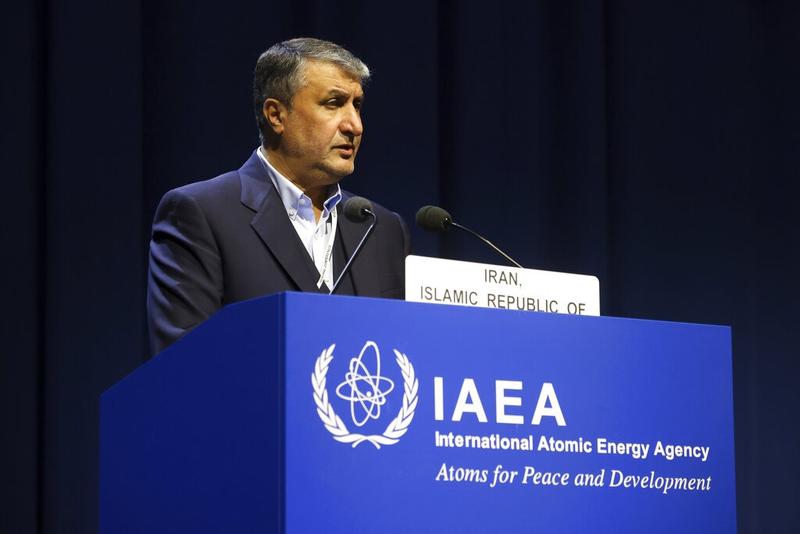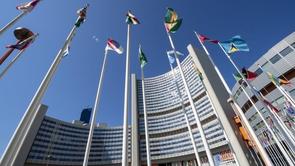 Mohammad Eslami, head of the Atomic Energy Organization of Iran (AEOI) speaks at the 66th General Conference of the International Atomic Energy Agency (IAEA) in Vienna, Austria on Sept 26, 2022. (THERESA WEY / AP)
Mohammad Eslami, head of the Atomic Energy Organization of Iran (AEOI) speaks at the 66th General Conference of the International Atomic Energy Agency (IAEA) in Vienna, Austria on Sept 26, 2022. (THERESA WEY / AP)
TEHRAN - The Iranian nuclear chief said on Wednesday the draft of an anti-Tehran resolution prepared for adoption at the ongoing meeting of the International Atomic Energy Agency (IAEA) Board of Directors "lacks validity" and is "rejected" by Iran.
On Tuesday, diplomats revealed that the United States, Britain, France and Germany had submitted a resolution to the IAEA calling on Iran to cooperate fully with the UN nuclear watchdog, according to media reports
President of the Atomic Energy Organization of Iran (AEOI) Mohammad Eslami made the remarks to reporters on the sidelines of a cabinet meeting, in reaction to Wednesday's meeting of the IAEA Board of Directors and a potential resolution to be adopted during the session against Tehran, according to Iran's official news agency IRNA.
On Tuesday, diplomats revealed that the United States, Britain, France and Germany had submitted a resolution to the IAEA calling on Iran to cooperate fully with the UN nuclear watchdog, according to media reports.
Eslami said Iran has an "approved, written and announced" nuclear program and will continue its activities within its framework, noting that AEOI has responded to every allegation made by the IAEA.
ALSO READ: Iran says Tehran, IAEA working on "good, robust" agreement
He added that if relevant parties had the necessary goodwill and sought to continue the negotiations on the revival of a 2015 nuclear deal, they would not have presented the draft of an anti-Tehran resolution.
 n this file photo, international flags flutter outside of the UN headquarters during the opening of the International Atomic Energy Agency Board of Governors meeting at the IAEA headquarters in Vienna, Austria on Sept 10, 2018. (JOE KLAMAR / AFP)
n this file photo, international flags flutter outside of the UN headquarters during the opening of the International Atomic Energy Agency Board of Governors meeting at the IAEA headquarters in Vienna, Austria on Sept 10, 2018. (JOE KLAMAR / AFP)
President of the Atomic Energy Organization of Iran (AEOI) Mohammad Eslami added that if relevant parties had the necessary goodwill and sought to continue the negotiations on the revival of a 2015 nuclear deal, they would not have presented the draft of an anti-Tehran resolution
IAEA director-general Rafael Grossi has said on several occasions that Iran failed to cooperate with the watchdog after uranium traces were identified at three "undeclared" sites in the country.
Iran, which denies such claims, said it has cooperated with the agency closely and transparently, and fully informed it of its nuclear activities.
Iran signed a nuclear deal, formally known as the Joint Comprehensive Plan of Action (JCPOA), with world powers in 2015, agreeing to put some curbs on its nuclear program in return for the removal of the international sanctions on the country. However, the United States pulled out of the deal in 2018 and reimposed its sanctions on Tehran, prompting the latter to reduce its nuclear commitments under the deal.
READ MORE: IAEA report: Iran expanding enrichment at Natanz site
The talks on the JCPOA's revival began in April 2021 in Vienna. No breakthrough was achieved after the latest round of talks in early August.


